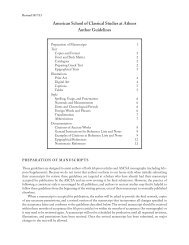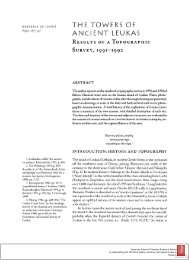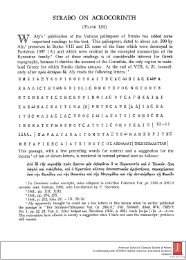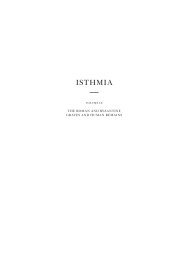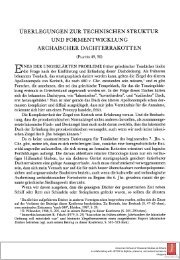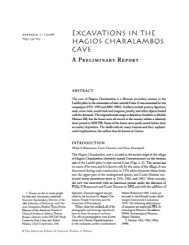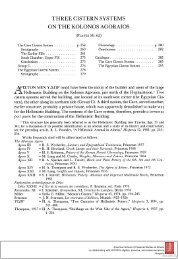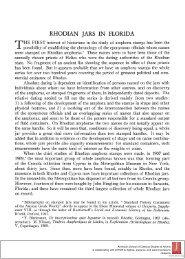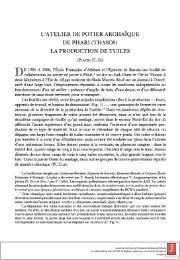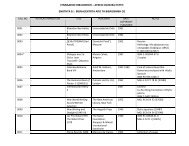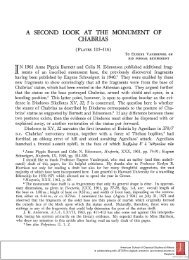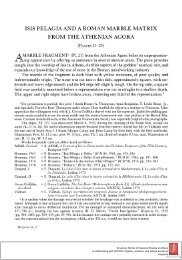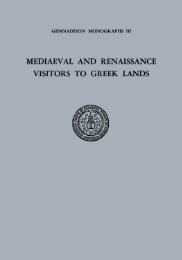the attic stelai - The American School of Classical Studies at Athens
the attic stelai - The American School of Classical Studies at Athens
the attic stelai - The American School of Classical Studies at Athens
You also want an ePaper? Increase the reach of your titles
YUMPU automatically turns print PDFs into web optimized ePapers that Google loves.
THE ATTIC STELAI 265<br />
<strong>The</strong> word occurs only once in our Stelai (X, 17), where it is <strong>the</strong> group <strong>of</strong> letters<br />
which seem to accord best with <strong>the</strong> traces read by Pittakys.32 It is to be noted, however,<br />
th<strong>at</strong> Pittakys himself restored aypo6 and th<strong>at</strong> <strong>the</strong> l<strong>at</strong>ter word has been coupled with<br />
xcOptov, as is <strong>the</strong> case in our entry, in Xenophon, H.G., II, 4, 1.<br />
6. OtKLca (IV, 6, 13, 20; VI, 13, 56, 76, 89, 94; VII, 23-24, 25-26, 73, 77; X, 1,<br />
15, 17). Oikia, used in Homer for <strong>the</strong> nests <strong>of</strong> birds and bees 3 and occurring in<br />
tragedy only in one papyrus fragment,34 is very common in Aristophanes and prose<br />
texts with <strong>the</strong> meanings <strong>of</strong> 'building, household, family,' etc.35 In legal contexts, it<br />
seems to refer generally to a 'priv<strong>at</strong>e residence.' Finley in his section on houses in<br />
<strong>the</strong> horoi has recently written, " an analysis <strong>of</strong> <strong>the</strong> economics <strong>of</strong> real security will show<br />
th<strong>at</strong>, in all likelihood, it is. <strong>the</strong> personal residence th<strong>at</strong> is usually meant by <strong>the</strong> word<br />
'house' in <strong>the</strong> horoi." 36<br />
7. OtK6ITE8oV (VI, 100). Oikopedon, a rare word, is found in one passage in<br />
Pl<strong>at</strong>o in a context which shows th<strong>at</strong> a building is meant.37 <strong>The</strong> word occurs once, too,<br />
in Thucydides, in connection with <strong>the</strong> fortific<strong>at</strong>ions <strong>of</strong> Delium (IV, 90): " <strong>The</strong>y<br />
threw in grape-vines as well as stones and bricks from <strong>the</strong> neighboring oikopeda which<br />
<strong>the</strong>y pulled down." E. Betant transl<strong>at</strong>es <strong>the</strong> word as ' substructio,' 38 which receives<br />
support from <strong>the</strong> definitions <strong>of</strong> Phrynichos 3' and Photius, 40 but <strong>the</strong> use <strong>of</strong> WXh-'Oov<br />
and KaOactpovIi-Eq indic<strong>at</strong>es th<strong>at</strong> neighboring buildings are meant.4' In Aristotle, Pol.,<br />
1265b, 24, where Liddell-Scott-Jones incorrectly defines oikopedon as ' site <strong>of</strong> a house,'<br />
it is clear th<strong>at</strong> buildings are meant.42 Aristotle here is criticizing passages in Pl<strong>at</strong>o's<br />
32<br />
See Hesperia, XXII, 1953, p. 291.<br />
33<br />
II., XII, 168, 221; XVI, 261.<br />
34 Euripides, Phaethon, 204. It is also found as a variant reading for E'UTta in Medea, 1130.<br />
35 See Liddell-Scott-Jones, s.v. For <strong>the</strong> most detailed study <strong>of</strong> <strong>the</strong> word and its synonyms, see<br />
J. H. H. Schmidt, Synonymik der griechischen Sprache, II, Leipzig, 1878, pp. 508-526. Buck<br />
(Dictionary, p. 458) st<strong>at</strong>es concerning OUKOS, OtKta<br />
and <strong>the</strong>ir Indo-European cogn<strong>at</strong>es, " In this group<br />
<strong>the</strong> notion <strong>of</strong> ' house' as a building is subordin<strong>at</strong>e to th<strong>at</strong> <strong>of</strong> 'home, settlement, family '."<br />
36 Op. cit., p. 65. It is to be noted th<strong>at</strong> in Delian inscriptions, oikia is <strong>the</strong> word used for houses<br />
situ<strong>at</strong>ed in <strong>the</strong> city <strong>of</strong> Delos. In <strong>the</strong> records <strong>of</strong> <strong>the</strong> est<strong>at</strong>es <strong>of</strong> <strong>the</strong> Temple <strong>of</strong> Apollo, only one est<strong>at</strong>e<br />
had an oikia. <strong>The</strong> principal building on <strong>the</strong> est<strong>at</strong>es was <strong>the</strong> kleision, which Kent (op. cit., p. 298),<br />
who has collected <strong>the</strong> evidence, transl<strong>at</strong>es as 'farmhouse.'<br />
37 Lg., V, 741c. See Liddell-Scott-Jones, s.v.; E. des Places' transl<strong>at</strong>ion in <strong>the</strong> Bude series,<br />
ad loc.; and Finley, op. cit., p. 253, note 50. <strong>The</strong> transl<strong>at</strong>ion in <strong>the</strong> Loeb text <strong>of</strong> <strong>the</strong> Leges ('houseplot')<br />
is here incorrect. Lg., V, 740a shows th<strong>at</strong> Pl<strong>at</strong>o is making reference to <strong>the</strong> apportionment<br />
<strong>of</strong> land and houses.<br />
38 Lexicon Thucydideum, Geneva, 1843, s.v.<br />
39 See Bekker, Anecd., I, p. 32, 2. Cf. <strong>the</strong> interesting comments <strong>of</strong> Andreades, Hist. <strong>of</strong> Gr. Pub.<br />
Finance, pp. 151-152, note 8.<br />
40 Lexicon, ed. S. A. Naber, II, Leiden, 1865, p. 5, OtKO E80V v 7pOV<br />
? KaTaLTTw( OLKOV.<br />
41 See Classen-Steup, Thukydides, ad loc.<br />
42<br />
So Barker, op. cit., p. 59.



